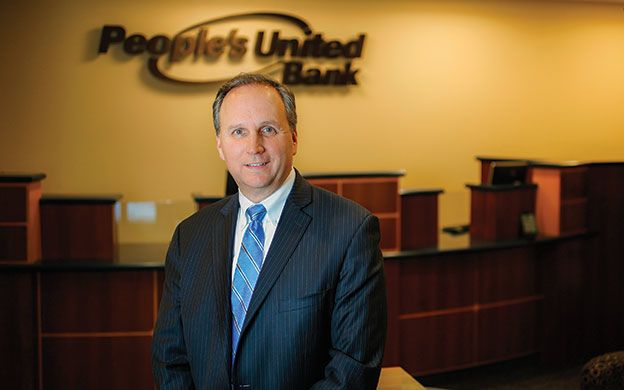People’s United Bank expanding in Portland
 File Photo / Tim Greenway
File Photo / Tim Greenway
People's United Bank, the seventh-largest bank in Maine with deposits of $1.1 billion, is expanding with a new Maine headquarters location and branch at 350 Fore St., the former site of Merrill Lynch. It plans to open the new location on Jan. 27, according to Daniel Thornton, Maine market president of People's United.
The bank will keep the first floor of its current 467 Congress St. site, which has a valuable drive-through space and a traditional marble lobby with high ceilings.
In an era when escalating regulatory compliance costs are sparking bank mergers, People's, which has a large commercial clientele, still emphasizes brick-and-mortar locations.
When Mainebiz sat down with Thornton in mid-January to talk about the expansion, the new office was still being completed. However, he already was enjoying its perks. “Look at that view,” he said, gazing across Commercial Street to Casco Bay. An edited transcript follows.
Mainebiz: Why are you expanding and moving into a new space now?
Daniel Thornton: We wanted to move all 43 of us off three floors in the current building into one space on one floor in the new one. We were able to shrink 20,000 square feet of space into 13,000 square feet in a much newer building and use it more efficiently. The old building now will just have a branch and drive-through with 3,000 square feet. Plus our lease is ending. With the new building there are four new hires: two tellers, a customer service manager and branch manager. And we've gone from 26 to 27 branches, all staffed. We have a sales team in this new office, our wealth management division, treasury management division, retail, commercial and small business. We wanted everyone to be part of the team and on the same floor.
MB: Are your branches in Maine concentrated in one part of the state?
DT: We're pretty much on the Route 95 corridor from Kittery to Bangor. I'd love to fill in the gaps. I have nothing in Augusta or Lewiston-Auburn.
MB: How many employees are in Maine and how will that change? How about branches?
DT: 221. It will probably remain pretty stable. Branches are tough. Bricks and mortar aren't what everyone is doing these days. We're trying to invest in technology with this new branch and attract younger customers.
MB: Are your customers primarily businesses?
DT: It's a pretty good mix. We have a wealth management group that's the biggest part of our business in Maine. It has close to $1 billion under management here. If you look at all of our loans together, we're just under $900 million. That's consumer, home equity, residential, commercial, business banking. Of that, two-thirds is what we call business banking, commercial.
MB: What differentiates your bank?
DT: We're big enough to do big deals, but we're a regional bank that has local control and enough localized decision-making that we can do stuff on the ground, too. We're in the loan space of $5 million to $20 million.
MB: You mentioned technology is part of the move. What is new?
DT: There are three things in this new office that I'm thrilled about. One is multidenominational ATMs that dispense $1s, $5s, $10s and $20s. You also can deposit checks and it gives you a receipt with your checks printed on it. This is our first branch in Maine to do this. I'm not saying it's cutting edge, but it's new for us. Second is cash recyclers that count a stack of bills for a faster cash experience. Third is instant debit cards.
MB: What trends do you see here?
DT: Customers are conservative with their business expansion plans. Two-thirds of business owners don't have a succession plan so they sell to people outside the state, and then they don't need a bank, an insurance company, a lawyer or an accountant locally anymore. And because of taxes, a lot of our wealthy individuals have established residency elsewhere. Why wouldn't we fix that? Regulatory costs are up and energy costs are high. But I still feel very good about growing in Maine.









Comments